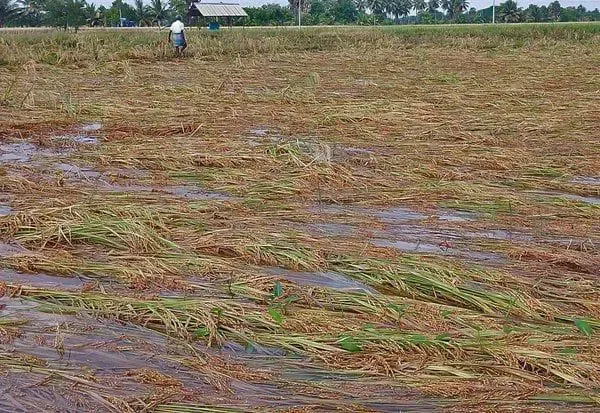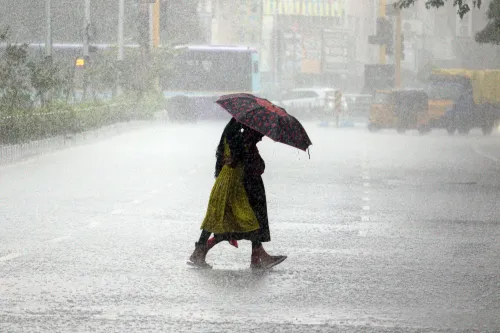Could Heavy Rain Lead to Crop Losses for Farmers in Thanjavur?

Synopsis
Key Takeaways
- Heavy rains have caused significant damage to paddy crops in Thanjavur.
- Farmers are concerned about crop quality and potential financial losses.
- Government procurement centers have not opened on time, delaying harvesting.
- Rising costs of mechanical harvesting are adding to farmers' challenges.
- Urgent government relief measures are being called for by farmer associations.
Chennai, Oct 21 (NationPress) Recent unseasonal and intense rainfall has caused extensive damage to the short-term paddy crop in Tamil Nadu's Thanjavur district, resulting in large areas of farmland being submerged just as the crops were about to be harvested.
This downpour has struck one of Tamil Nadu’s primary rice-producing areas at a crucial time, leaving countless farmers anxious about possible crop losses.
As per the Agriculture Department, paddy was cultivated over 1.99 lakh acres during this year's Kuruvai season, with 1.65 lakh acres already harvested. However, standing crops in regions like Orathanadu, Thanjavur, and Ammapettai are now vulnerable to waterlogging, with an estimated 1,500 acres of short-term paddy currently submerged.
The heavy rains have flattened vast sections of paddy fields, preventing farmers from accessing their crops due to the standing water.
Farmers have expressed that this unexpected rainfall could result in significant yield losses if the water does not drain quickly. “The crops that were ready for harvest are now sitting in water. Even if we manage to harvest now, the grains will suffer in quality,” said several growers from Orathanadu.
Moreover, they noted that government procurement centers have not commenced operations timely, causing delays in harvesting. Agricultural experts caution that the longer the water lingers, the more detrimental it will be to both grain quality and soil structure.
As fields remain waterlogged, the expenses associated with hiring mechanical harvesters have also escalated.
Farmers highlight that operating machinery on wet land poses challenges and significantly raises costs, further exacerbating their financial struggles.
Officials from the Revenue and Agriculture departments are currently evaluating the scale of crop damage.
Farmer associations are urging the state government to implement relief measures and provide compensation to those impacted.
With the Northeast Monsoon picking up intensity, farmers in Thanjavur, who are integral to Tamil Nadu’s delta rice belt, are now facing the daunting possibility of losing their entire short-term paddy yield to the wrath of nature.









